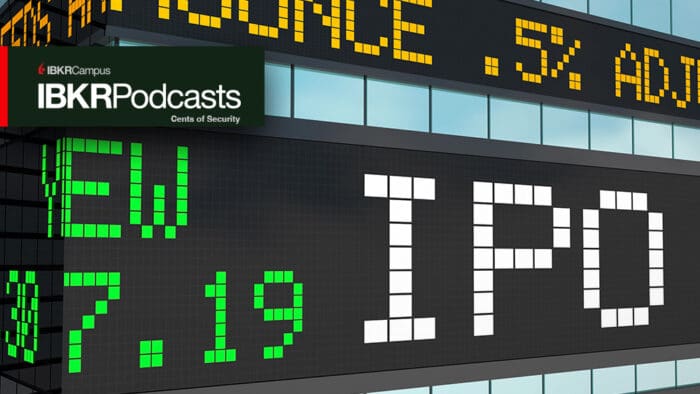When private companies go public by selling shares on an exchange for the first time, it is called an initial public offering or an IPO. How does a company get to the IPO stage? What are the steps involved? Jack Cassel, Head of New Listings at NASDAQ joins Cassidy Clement, IBKR’s Senior Manager of SEO and Content to discuss.
Summary – Cents of Security Podcasts Ep. 37
The following is a summary of a live audio recording and may contain errors in spelling or grammar. Although IBKR has edited for clarity no material changes have been made.
Cassidy Clement
Welcome back to the Cents of Security podcast. I’m Cassidy Clement, Senior Manager of SEO and Content at Interactive Brokers. Today, I’m your host for our podcast and our guest is Jack Cassel, Head of New Listings at NASDAQ.
When private companies go public by selling shares on an exchange for the first time, it is called an initial public offering or an IPO. It’s likely that you’ve heard of this term before if you’re listening to our podcast, however, most would ask how would a company get to the IPO stage? What are the steps involved, et cetera. So today we’re going to discuss the basics of IPOs. Welcome to the program, Jack.
Jack Cassel
Thank you. Thanks so much for having me.
Cassidy Clement
Of course. So how about because this is your first episode with us, you give our listeners some background on yourself as they may know NASDAQ, but they might not know you.
Jack Cassel
Sure, sure. Well, hopefully they know NASDAQ. In my seat as Head of New Listings, what that means is I manage Nasdaq’s IPO business, specifically for the Americas and EMEA, so that’s my world.
I work closely with our Vice Chairman who overseas our APAC region and primarily our focus is working with private companies as they transition to the public markets. I’ve been at NASDAQ for almost six years now. I was investment banking for a number of years before that. And in my time here, I’ve had the privilege of working on over 1000 IPOs with my broader team and bringing them to market.
And at NASDAQ, we’ve averaged about 70% of the companies becoming public, listing their shares on NASDAQ. So it’s been a great opportunity to work with some of the most innovative companies in the world as they get to this next stage of their life and journey as a company.
Cassidy Clement
Well, it sounds like you’re the right person to ask about IPOs, because I heard that word and that acronym in there quite a bit. So just kicking off with the basics here, what exactly is an IPO and where would a listener usually hear that being thrown around other than financial commentary?
Jack Cassel
Yeah. So an IPO is an initial public offering and that’s the process through which a privately held company offers shares of its stock to the public for the first time. So that’s that initial part of it. It’s a significant milestone for a company as it transitions from being privately owned, typically by founders or early investors to then becoming a publicly traded company on a Stock Exchange.
The key reasons companies will choose an IPO or this path are really what I call “the key four”.
So first is access to capital. So through the IPO itself, they will raise money. So they’ll be selling equity to the public and they will take that cash from the offering and put it on the balance sheet. So now they’re going to have, it’s a fundraising opportunity for them.
And then it also allows them to later on post the initial public offering, they can do follow on offerings or secondaries to the public markets. And we see a lot of companies also start to leverage this to raise debt or do a debt offering.
The second key piece of an IPO, reasons companies do it is liquidity to their existing shareholders. So, founders, employees, early investors may all wish to sell some of their shares. And this really becomes an attribute for private companies as it helps them to retain the talent they have. But also to attract new talent. So as they go out to get those other executives or engineers or just talent in the marketplace now they have a liquid equity or stock that they can have as part of their compensation package.
The third one is branding and credibility in the market, so I mentioned this is a huge milestone for companies. We do a great job. I feel that NASDAQ is really promoting and amplifying the brand and the message through this. So you’re going to have a lot of, not only TV and ringing the bell with us, but also a lot of coverage through the market. So it gives you a great branding opportunity. A lot of companies that do this will also be reaching out to their customers, as well as their prospects. Hey, by the way we went public, we’d. love to talk. And then also gives you that credibility in the market. So as you think of that sales process or those partnerships, hey, we just went public, we’re going to be here for many years to come. And so it gives you that stamp of approval.
And then the fourth I’d say key reason is for M&A transactions. So, this then now allows, as I mentioned with the compensation piece, as companies look to possibly merge or acquire new companies or targets, they have a stock component to the transaction structure. So they can go in with cash as well as stock and it helps them to create a more favorable structure hopefully for both parties.
I will say there are disadvantages for certain companies. So every company has to look at this and do their own diligence. But with going public, you’re under strict regulation and it can be costly to run this process. Some companies push back on giving up some of their ownership in the company. And then also you’re under public or I should say there could be public scrutiny around this, right?
So every everything that happens, you’ll have to disclose any material updates, you’ll have to disclose in your filings. And so that can lead to a bit more scrutiny from investors as well as the media. But for the companies that plan properly and do this well, the IPO is an incredible opportunity for them to tell their story to the to the markets and to the world and go on and hopefully be successful.
Cassidy Clement
There were a lot of different reasons I had mentioned there for an IPO, so could anyone or any company issue an IPO or is it more so that you got to do your homework and then you’re able to do it or maybe get vetted?
Jack Cassel
In theory, yes. Any private company can pursue an IPO if it meets the certain criteria and requirements set by really the regulatory body. So such as the SEC. And then also the exchanges. I will say, though, in practice, not all companies choose to go public through an IPO. And as I mentioned, just because of the complexity and the costly nature of it.
So companies considering an IPO typically need to meet certain financial or regulatory criteria which can include minimum revenue thresholds, profitability requirements, corporate governance standards or even disclosure obligations. And then also companies often need to have a compelling business model, strong growth prospects and a track record of success to really attract investor sentiments and interest through their IPO.
So a lot of younger companies or earlier stage companies may not meet that criteria so though it may be something they see the benefits of doing, they may still choose to stay private for a bit longer or seek alternative sources of funding before they are really ready to go public. So while any company can technically pursue an IPO, the decision still does depend on a variety of factors, again including their goals, financial readiness, and I’d also say the market conditions. And I think the latter is what we’ve seen over the last 18 months or so here on a lot of companies being ready to go public. So having a lot of the foundational step complete.
However, the markets have not necessarily been ready for IPOs, or at least at that scale. So they’ve decided to hit pause. And then, you know, pick up plans when they feel that again the markets are more conducive for new offerings.
Cassidy Clement
You mentioned different phases I guess you could say of where they’re at in maturity, maybe as a company or financial level. So what stage or if you could kind of paint a picture of a stage, does a company usually file for their first offering? Is there some type of revenue chart or something like that that is looked at like we’re seeing an upward tick. So you look like you fit the bill or is there a certain type of audit that they go through? Anything like that?
Jack Cassel
So yeah, so the company can file for an IPO at any stage. Really, again, depending on the specific circumstances. But there is really no one-size-fits-all. So I break it down as we look at the world kind of three stages: early, mid and late. And so for early-stage companies with strong growth potential similar to kind of what you’re seeing, that uptick in revenue, they may choose to go public when they have a compelling business model, maybe significant market traction and a lot of growth ahead of them. And then again, a lot of that story is paired with the need for additional capital to continue to fuel that expansion and accelerate that growth. I think as we look at the IPOs, most of the early stage companies tend to fall in more of the biotech or pharma sectors.
The second one is the mid-stage companies that have achieved a certain level of maturity and scale but still have room for growth. And so these companies may have more established products or services in the market, an established and growing customer base, maybe more of a story around path to profitability, that’s been a key diligence question over the last 18 months.
And so going public can provide these companies with again access to additional capital, now liquidity for those shareholders and then again the visibility and credibility in the market for their customer base.
And then lastly is the late-stage companies. So these are companies that have achieved significant scale in their revenue. Likely profitable, maybe a slower growth rate, but again profitable, they tend to be market leaders in their respective sectors or market. And so these are companies that have already raised substantial funding from private investors and therefore the IPO, again, same attributes or benefits to why they’d IPO.
But in a lot of instances, they’re too large or scaled maybe for an MNA transaction or depending on the investors in there and their time horizon, this may give them an opportunity to exit this investment and provide that same liquidity to the investors as well as those employees. So, I think ultimately the decision depends on all of those factors.
And that’s something where companies will want to start that process early, engage investment banks and legal advisors and really evaluate the pros and cons and then the timing of what it would take to be ready and then marry that with why they want to go public. And then based on that, you kind of work backwards towards whether it’s right for your business or company.
Cassidy Clement
There were a lot of different businesses that you kind of mentioned in a generalized example there, whether it’s small, medium, larger scale. Are the steps to list an IPO the same for all of them if you were to boil it down? Or is it maybe different based on the sizing or I guess you could say the revenue potential as you said?
Jack Cassel
I’ll start with the basic steps which are going to be yes, ubiquitous for everybody going through this process. And then again it will change based on the company based on the markets based on the different dynamics. But I think the first thing that companies have to consider and just know is it does take a lot of preparation. Sometimes a minimum 12 months, if not longer to actually get this whole process started, because I think a lot of executives as well as their boards forget that you have this entire process of preparing and doing all the diligence and work, while also having to take off, or I should say, put on your other hat of an operator and still close the books on time and manage your day job.
So it can be a lot. So the earlier you get started on this process just gives you more runway to execute two different jobs really. But I say the first step really is just kind of an assessment of the business and really looking at your readiness, so evaluating the financial performance that we discussed, the corporate governance practices. Again, meeting the regulatory requirements. Usually at that stage you’ll engage an accounting firm and then eventually you’ll go kind of accounting firm, legal counsel and then the investment banks. For companies going public, you will need to have two years of audited financial statements in the SEC filings to qualify as an emerging growth company.
Most companies will elect to do or include three years and then also if you’ve switched auditors at all during that period, we recommend or best practices consulting with both firms as the current firm may need to re audit the prior years. Also if the companies made any acquisitions or significant transactions like a large fundraise, they’ll need to understand what additional financial statements may be required in the filings, including pro forma financial statements and separate audited financial statements related to the acquired business.
So again a lot of work there that really takes time and needs to be completed before you’re you can start to even think about dates. Then another key step is going to be selecting the underwriters. So a company typically selects one or more investment banks to serve as an underwriter for the IPO, and these underwriters will determine the offering price structure of the deal market. The offering to potentially venture or investors and facilitate that sale of those shares.
And then a lot of them will have large research groups. So as you’re going through that process and speaking to the investment banks, typically they’ll introduce you to some of their analysts that will be covering the sector or potentially covering the stock post IPO. So I think that’s something, too- a best practice is starting to engage those analysts as well as even some of the investors much earlier in the process so they can understand your story, understand how you go to markets, what your expansion plans are, and then by the time that you’re ready to go public or you start kind of the actual process they’re already familiar with you and the company.
Then following selecting the underwriters, you will start drafting your registration statement. So this really includes detailed information on the company’s business, financial performance, the management team, risk that you could face both at the business level and the product level, macro and micro and then other relevant disclosures. And so that and then that document needs to be filed with the appropriate regulatory body. So again the SEC for us in here in the US.
And then once that’s filed, then the next kind of key step is just going to be that SEC review. So you submit that to the SEC for review and then this process starts their diligence on the prospectus of the registration statement. Which can involve several rounds of comments and revisions before it’s eventually declared effective. And then once it’s effective, the next step really is then flipping it public or filing that registration statement publicly, and that’s via a form S1 (Sierra 1) or F1 (Foxtrot 1). I didn’t know I was going to say foxtrot today, but there you go. And that’s for the foreign filers. And so that then starts the clock that now your registration statement is publicly filed and you’ll have a 15 day quiet period where you cannot market the deal at all. And then following that on day 16 or even later, the company will launch its roadshow.
And that’s where the company, its executives, in partnership with the investment banks and your underwriters will then start to present the investment case to institutional investors, analysts and other stakeholders. And then on the last days of that roadshow, the company and its underwriters will come together really the day before your IPO and then they’ll determine the final offering price of the shares and that’s going to be based on investor demand and again market conditions. And then also the underwriters will work through the allocation of those shares to investors who have placed orders for the IPO. And so this process can involve, again you’ll have kind of a pricing committee, but then you’ll work through that. So not only the price but the allocation to certain institutional clients, strategic partners, retail investors etcetera. So it’s a big kind of final day of the roadshow and then the next day you will come to hopefully NASDAQ and we’ll have the price. We’ll have the allocation and then we’ll start the IPO celebrations and final process on your day.
Cassidy Clement
Well, you heard it here first, folks. IPOs are not easy to launch. They are complex. There were many steps that we just covered that it takes. It is not an overnight process where I don’t know. You click a button submit and then all of a sudden, you’re listed on an exchange.
So to totally turn to a different side. Which we kind of covered the basics of what the IPO is, the company standpoint of how we get there. From the trader standpoint or the investor, where can these shares be listed or purchased as this IPO initially becomes launched?
Jack Cassel
Yeah, so IPO shares can be listed or purchased on various stock exchanges depending on where the company chooses to list. I think the US is unique in that we have two national stock exchanges with NASDAQ and the New York Stock Exchange where all the other countries have one national exchange. So, for instance, the London Stock Exchange or the Tokyo Stock Exchange, Hong Kong Stock Exchange. It’s going to be typically one of the large national exchanges.
There is also the OTC or the over-the-counter exchange or OTC market, which is a decentralized market where securities are traded directly between parties without the supervision of an exchange. So unlike NASDAQ or New York, which have centralized trading facilities and strict listing requirements, the OTC operates through a network of broker dealers who facilitate trades directly between buyers and sellers.
And so typically OTC markets you use for trading stocks of companies that don’t meet the listing requirements of the major exchanges. And so, these are again typically or traditionally your smaller companies, some penny stocks, some foreign stocks where they may be listed on a national exchange, but then in the US they have a small float and decide to trade on the OTC. I think one interesting trend we’ve been seeing here at NASDAQ over the last really 2-3 years is a big uptick is international companies looking to list on the US market.
So we’ve had significant success in companies, again, domiciled in other countries looking to the US. But we’ve really seen an uptick in those companies forgoing the domestic or local exchange and looking to the US capital markets. Just deeper pools of liquidity and really in a lot of instances better valuations to some of their peers. And then we’re also seeing companies looking at the US, especially over the last year or so, for their dual listing. So they may be listed there on their local or national exchange, but now looking to do a second offering here in the US for some of those benefits.
Cassidy Clement
Well, once these pieces are all complete and the IPO gets listed, do certain people have access to these IPOs before others, or is it kind of just like the floodgates are open and anybody can go and invest.
Jack Cassel
Yes. So there are certain categories of investors that may have access to the IPOs before publicly available, and that’s through that allocation process or even big book building process, which is typically managed through the underwriters. So I think just generally you know, institutional investors will have access or may have access and again it’s deal dependent of course, but this is large institutional investors such as mutual funds or pension funds, hedge funds, sovereign wealth funds. We’re seeing a large uptick in their participation here. And so in many instances, they’ll receive access to the shares.
And again, they’re typically looking to purchase large blocks of those shares. Then there’s and depending on the underwriters, sometimes there’s preferred clients for those underwriters. So think of your high net worth individuals or private wealth management clients or corporate clients. They may receive a small allocation to be distributed amongst the network. There’s also strategic investors. So those that have a close relationship or partnership with the company, those that can provide strategic value beyond just the financial investment. So that might be again customers, suppliers, partners. Then there’s employees and insiders. So think of employees themselves, executives, directors, other insiders may receive allocations as part of their compensation or incentive programs.
These are typically though subject to lock up periods where they’re prohibited from selling until a date or for a finite number of days. What we’ve seen, traditionally, is about 180 day lock up and then again it can be tiered depending on tenure or the individuals. And then lastly, is retail investors. So again, depending on the deal, but some retail investors may have access to pre-IPO deals or allocations through their brokerage accounts. So these are typically smaller scale versus institutional investors of course. But they may through again your broker dealer or think of you know your different apps. Some companies will have an allocation to the retail investors giving them access to it.
So I think overall the allocation of those shares is really determined by the underwriters in consultation with the company that’s obviously going to IPO. But I think it varies on a lot of different components, but the allocation process is very rigid and of course is subject to regulatory oversight to ensure fairness and transparency of course in the market.
Cassidy Clement
Well, we covered a lot of really good questions about IPOs and how we get there, both as an investor and a company. So thank you for joining us, Jack. It was great to have you on.
Jack Cassel
Thank you so much.
Cassidy Clement
Sure, of course. So as always, listeners can learn more about an array of financial topics for free at www.interactivebrokers.com. Follow us on your favorite podcast network, and feel free to leave us a rating or review. Thanks for listening, everyone.
Disclosure: Interactive Brokers
The analysis in this material is provided for information only and is not and should not be construed as an offer to sell or the solicitation of an offer to buy any security. To the extent that this material discusses general market activity, industry or sector trends or other broad-based economic or political conditions, it should not be construed as research or investment advice. To the extent that it includes references to specific securities, commodities, currencies, or other instruments, those references do not constitute a recommendation by IBKR to buy, sell or hold such investments. This material does not and is not intended to take into account the particular financial conditions, investment objectives or requirements of individual customers. Before acting on this material, you should consider whether it is suitable for your particular circumstances and, as necessary, seek professional advice.
The views and opinions expressed herein are those of the author and do not necessarily reflect the views of Interactive Brokers, its affiliates, or its employees.
Disclosure: OTC Securities
An investment in an OTC security is speculative and involves a high degree of risk. Many OTC securities are relatively illiquid, or "thinly traded," which tends to increase price volatility. Illiquid securities are often difficult for investors to buy or sell without dramatically affecting the quoted price. In some cases, the liquidation of a position in an OTC security may not be possible within a reasonable period of time.
Disclosure: Initial Public Offering
This communication does not constitute investment advice and is for informational purposes only. It is not a recommendation to buy or sell any security. Any investment decision should be made after careful consideration of all available information. The information contained in this communication may not be complete or accurate and may be subject to change.















Join The Conversation
For specific platform feedback and suggestions, please submit it directly to our team using these instructions.
If you have an account-specific question or concern, please reach out to Client Services.
We encourage you to look through our FAQs before posting. Your question may already be covered!